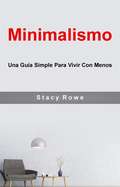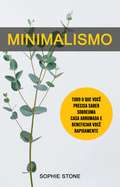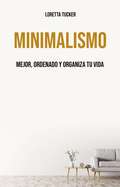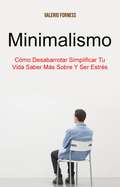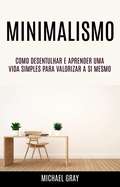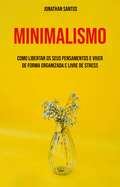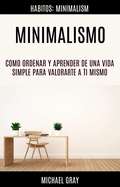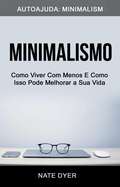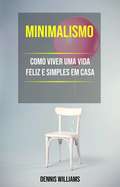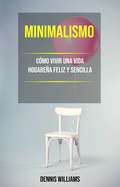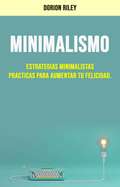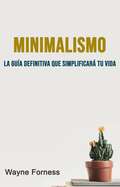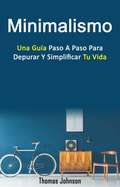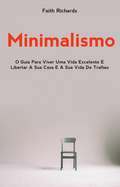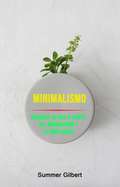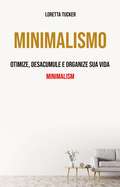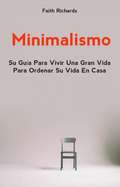- Table View
- List View
Minimalismo: Mejora tu Vida Entera
by Robert BrunoNuestras casas pueden ser un santuario u otra fuente de estrés y ansiedad. Si tu hogar ha estado siendo esto último, este libro está diseñado para ayudarte a recuperar lo que es tuyo. Nuestro propósito es brindarte la actitud mental, los consejos, las estrategias y los pasos prácticos para vivir la vida que te mereces. Descubre cómo la organización doméstica y la vida minimalista pueden optimizar tu espacio, niveles de estrés, tiempo, vida, energía y bienestar. Mi equipo y yo hemos recorrido personalmente un largo camino a través de este modo de pensar y sus pasos prácticos. A menudo, cuando las personas piensan en convertirse en un minimalista y llevar un estilo de vida minimalista, piensan que tendrán que vender todo lo que poseen, no podrán comprar las cosas que necesitan y la vida será miserable. Ya que el deseo humano no es algo que podamos saciar, ¿qué puedes hacer para liberarte de él y comenzar a vivir una gran vida con lo que tienes ahora, incluso mientras luchas por una vida mejor? La respuesta es el minimalismo. ¿Qué es el minimalismo y qué tiene que ver con ayudarte a vivir una gran vida, una vida libre del deseo incesante de desear? Revelar esto, es el propósito de este libro. ¿Qué estás esperando? ¡No esperes más! ¡Desplázate hacia arriba y haz clic en el botón comprar ahora para comenzar el viaje a la vida de tus sueños!
Minimalismo: Minimalismo
by Dewan ConnorEste libro tiene pasos comprobados y estrategias de cómo reducir el estrés e incrementar la felicidad viviendo un estilo de vida minimalista. IEn este libro descubrirás que el estilo de vida minimalista no está limitado a posesiones materiales, puede ser aplicado en tu vida diaria comenzando por organizar tu casa y reorganizando tu horario. Aprenderás a regresar a lo básico y un simple comienzo. Este libro le enseñará a convertirse en un minimalista sólo cambiando algunas cosas en tu tiempo. Adoptando un estilo de vida minimalista cambiará tu manera de conducirte y tu apariencia en la vida.
Minimalismo: Una Guía Sencilla para Vivir con Menos
by Stacy RoweMuchos de nosotros valoramos las cosas que poseemos, y si bien esto es comprensible, asignarle demasiado valor a estas cosas puede ser peligroso. La mayoría de nosotros pasamos nuestras vidas renunciando y abandonando oportunidades solo para poder trabajar y ganar para comprar objetos y posesiones. Una bonita casa con un hermoso jardín, un elegante automóvil, lo último en ropa y accesorios, aparatos electrónicos de alta tecnología, o incluso platos gourmet y viajes alrededor del mundo son solo algunas de las cosas que la gente valora. La verdad es que la mayoría de las personas no están haciendo las cosas difíciles intencionalmente, es simplemente que no tienen las herramientas adecuadas para simplificar su vida. Hay técnicas fáciles y efectivas que cualquiera puede usar para adoptar un estilo de vida minimalista y reducir el “equipaje” extra de la vida que nos pesa. Descubre cómo hacerlo en esta guía. El método habitual de organización en el hogar es mover todo de un lugar a otro. Todo lo que hacemos es mover el desorden a otro lugar. Cuando tu casa esté realmente despejada, también lo hará tu mente. Encontrarás que tienes más libertad.
Minimalismo: Una Guía de la Vida Real para Organizar tu Situación Actual
by Renae StantonLos minimalistas son personas que conscientemente e intencionalmente intentan vivir con lo que realmente necesitan. El mantra sería: "Identifica lo esencial y elimina todo lo demás". Los minimalistas están en contra del consumo incontrolado. Parece que cuando tienes más cosas que puedes usar y quieres más de lo que puedes pagar, entras en un círculo vicioso en el que tus cosas no funcionan para ti, sino que trabajas para ellas, para impresionar a otras personas y aumentar tu status la vida Una vez que entendemos todas estas cosas, el minimalismo es simple. Se convierte en una parte de quienes somos. Es un estilo de vida, una mentalidad y una oportunidad. Todos nosotros podemos reducir nuestras pertenencias. Todos nosotros podemos ordenar nuestras casas y mentes. Ese es el objetivo de este libro. Aprender cómo tener menos significa hacer más de lo que amamos cuando queremos hacerlo. No tienes que deshacerte de todo, solo tienes que saber qué debes abandonar y qué debes mantener.
Minimalismo: Tudo o que você precisa saber sobre uma casa organizada e arrumada, e colher benefícios rapidamente.
by Sophie StoneMinimalismo: Tudo que você precisa saber sobre uma casa organizada e arrumada, e colher benefícios rapidamente. Por Sophie Stone O minimalismo é uma filosofia que tem sua base em concentrar-se apenas nas coisas essenciais. Uma abordagem minimalista faz com que você não sobrecarregue sua vida com coisas desnecessárias e que você simplificou tudo o máximo possível. Cada pessoa é livre para decidir seus próprios limites ao adotar o minimalismo. Uma coisa é certa: tornar-se um minimalista fará você se sentir melhor, mais feliz e mais saudável em pouco tempo! O minimalismo lhe dá essa oportunidade. O minimalismo oferece uma perspectiva diferente sobre a vida, onde a qualidade, não a quantidade, é o que passa a importar. Onde a autenticidade supera a propaganda. Onde conteúdo, qualidade e elegância são reconhecidos como os verdadeiros valores. Minimalismo não significa levar uma vida nômade. Também não vai fazer de você um recluso. Minimalismo não é um termo chique que é a moda agora; é sobre ser simples, desfrutar de total liberdade, passar da posse para a paixão e viver para saborear a vida. Levar um estilo de vida minimalista não é fácil, mas uma vez dominada a técnica, você descobrirá um novo significado de vida. Não espere mais para descobrir sua chave para uma vida nova e melhor.
Minimalismo: N/A
by Loretta TuckerEste libro contiene pasos probados y estrategias sobre cómo convertirse en la persona organizada que envidian todos los amigos. Retrocede mientras se maravillan con su increíble closet y secretamente desean que puedan tener la fuerza de voluntad para hacer lo mismo. Bienvenido a Despeja Tu Casa: Técnicas modernas para la felicidad a través de la vida simplificada. La esencia aquí es clara, legible y fácil de aplicar, este libro fue creado para; en un solo volumen, presentarle numerosas técnicas, métodos y estrategias, todas ellas diseñadas para eliminar el desorden y el estrés, maximizar el espacio y proporcionar un ambiente de vida feliz. Hemos saturado tanto nuestras vidas con tantas cosas materiales que hemos acabado sintiéndonos huecos y abrumados por las cosas que compramos realmente habiéndonos convencido de que las necesitamos.
Minimalismo: Cómo Desabarrotar Simplificar Tu Vida Saber Más Sobre Y Ser Estrés
by Valerio FornessLa persona promedio es bombardeada diariamente con miles de mensajes de publicidad que presentan productos que uno debe tener. Su meta final es vender, sea que el producto sea necesitado o no. Así es como usualmente nos vemos deseando cosas que vemos en la televisión o en línea. Gradualmente, ves estos objetos menos y menos hasta que se quedan escondidos en una esquina. Si eres honesto contigo mismo, verás que no necesitas muchas posesiones físicas para tener una vida plena. Simplemente puesto, un estilo de vida minimalista puede ser caracterizado por una vida simple basada en priorizar experiencias que te traen valor. Hemos por mucho tiempo confiado en la tecnología para hacer nuestras vidas más fáciles. Ahora, tenemos que comenzar a depender de nosotros mismos para hacer la vida más feliz y de eso se trata el movimiento minimalista. El minimalismo es justo a como suena. Es un Estilo de Vida de Menos. ¿Por qué quieres menos? Puedes preguntarte a ti mismo bueno la verdad es que tus cosas pueden ser las razones por las que estás enloqueciendo. ¡Ven y únete a los miles de personas que se unen a las maneras Minimalistas ahora y aprende a crear una vida simple pero gratificante!
Minimalismo: Como Desentulhar E Aprender Uma Vida Simples Para Valorizar A Si Mesmo
by Michael GrayEste livro também explicará por que essas dicas são importantes, o que significa que quando você terminar de ler, você saberá as razões por trás das ações, não apenas as ações em si. Isso é sempre importante para quem quer ser bem sucedido na busca de um estilo de vida minimalista. Eu gostaria de aproximar você de um estilo de vida que é o oposto do consumo excessivo: o minimalismo. O minimalismo trará serenidade, paz e alegria de volta à sua vida. Através deste livro, você entenderá porque é hora de virar as costas para a sociedade de consumo e cultivar um estilo de vida minimalista. Aqui vou dar-lhe um passo a passo detalhado para o seu próprio caminho individual para uma vida minimalista. Então você vai se sentir como eu no meu passado, até que eu mudei minha vida e mudei para um estilo de vida minimalista! Então não hesite e comece agora uma vida simples, feliz e sem stress com o meu guia minimalista !!! Role para cima para comprar sua cópia hoje!
Minimalismo: Como Libertar Os Seus Pensamentos E Viver De Forma Organizada E Livre De Stress
by Jonathan SantosEste livro procurará abordar a importância de abraçar um estilo de vida minimalista e a forma como organizar um lar para que possa disfrutar dos benefícios de uma casa arrumada. Um dos benefícios será a paz de espírito que irá encontrar, ou tal como lhe chamamos, uma paz Zen - um estado maior de consiência que nos poderá ajudar a sentir completamente preenchidos e felizes. A alimentaçao será o consumível mais benéfico para abordar ao nível individual. É o que terá mais impacto imediato no seu orçamento, estômago e cérebro. A Limpeza do Consumo, um mapa sensato, baseado na investigação e concretizável para um consumo consciente de alimentação e bebidas. O autor trouxe a nú o marketing e o disparate corporativo que envolve muitos dos nossos alimentos comuns para revelar a verdade sobre o que comemos. Se está pronto para passar à ação e mudar a sua vida para melhor, este livro irá, definitivamente guiá-lo na direção certa!
Minimalismo: Como Ordenar Y Aprender De Una Vida Simple Para Valorarte a Ti Mismo (Habitos: Minimalism)
by Shawn JonesEste libro también explicará por qué estos consejos son importantes, lo que significa que cuando termine de leer sabrá las razones detrás de las acciones, no solo las acciones en sí. Esto siempre es importante para cualquier persona que quiera tener éxito en la búsqueda de un estilo de vida minimalista. Me gustaría acercarle a un estilo de vida que es lo opuesto al consumo excesivo: el minimalismo. El minimalismo traerá serenidad, paz y alegría a tu vida. A través de este libro, comprenderá por qué es hora de dar la espalda a la sociedad de consumo y cultivar un estilo de vida minimalista. Aquí le daré una guía detallada paso a paso para su propio camino individual hacia una vida minimalista. ¡Entonces te sentirás igual que yo en mi pasado hasta que haya cambiado mi vida y haya cambiado a un estilo de vida minimalista! Así que no dude y comience ahora a vivir una vida simple, feliz y sin estrés con mi guía de minimalismo.
Minimalismo: Como Viver Com Menos E Como Isso Pode Melhorar a Sua Vida (Autoajuda: Minimalism)
by Nate DyerMinimalismo. Provavelmente uma palavra que você ouviu falar antes, mas não sabe bem o que significa. Talvez tenha ouvido seus amigos se gabar de seu estilo de vida minimalista, está intrigado com o conceito e quer saber mais. O que é minimalismo? É um modo de vida em que apenas o importante é deixado à vista: todas as coisas importantes e todas as pessoas importantes. Simplificando, é isso. Minimalismo é uma ideia que pode ser usada para viver bem. É uma ferramenta que leva à libertação gloriosa de qualquer que seja o medo que venha a atormentar a população humana ao longo do tempo. Isso nos permite parar de nos preocupar com tudo. Também oferece liberdade do mundo que criamos sobre nós mesmos como consumidores sistemáticos. Temos a escolha de assumir o controle de nossas vidas e nos tornarmos plenos. Com seções sobre downsizing, criação de rotinas de manutenção, dicas para engajar sua família, minimalismo emocional, orçamento e como visualizar e viver o estilo de vida minimalista que você deseja, você terá várias ferramentas que podem ajudá-lo a realizar mais do que apenas livrar-se de um monte de coisas. Neste conteúdo você encontrará perguntas, desafios e estratégias de auto-conhecimento que podem levá-lo a encontrar o SEU tipo de minimalismo. Se você está pronto para agir e mudar sua vida para melhor, este livro definitivamente irá guiá-lo na direção certa!
Minimalismo: Como Viver Uma Vida Feliz E Simples Em Casa
by Dennis WilliamsVocê está cansado de ser um escravo do consumismo? Estamos constantemente expostos a propagandas que tentam nos convencer que muito é melhor do que menos. O problema é que, quanto mais temos, mais estresses geramos a nós mesmos. A escolha é sua. Se você está se perguntando como fazer a transição para uma vida mais simples, então esse livro lhe dará um caminho de forma muito clara. Este guia do minimalismo será parte do processo no qual você tomará decisões de como saber priorizar e viver a sua vida. Este livro o conduzirá por meio de dicas, truques, hábitos e estratégias que você poderá incorporar no seu dia a dia para que assim, você consiga retomar as suas paixões e reaver a sua liberdade. Se você sente-se pronto para aprender a viver com menos e, assim, ter um impacto significativo na sua vida e no mundo ao seu redor, então esse livro é a sua leitura ideal. Adquira sua cópia hoje clicando no botão no final desta página!
Minimalismo: Cómo Vivir Una Vida Hogareña Feliz Y Sencilla
by Dennis Williams¿Estás cansado de ser esclavo del consumismo? Todos hemos estado expuestos a anuncios que intentan lavarnos el cerebro para que pensemos que más es mejor que menos. El problema es que con más cosas también tendremos más estrés. Realmente depende de ti tomar la decisión. Si te estás preguntando cómo hacer la transición y simplificar tu vida, este libro expone el tema de una manera muy clara y sencilla. Esta guía de minimalismo es un proceso claro y sin rodeos que puedes utilizar para tomar decisiones inteligentes sobre cómo priorizar y cómo vivir tu vida. Este libro te guía a través de sugerencias, trucos, hábitos y estrategias que puedes implementar para realizar constantemente cambios reales y sostenibles en el tiempo, de modo que puedas priorizar tus pasiones y recuperar tu libertad. Si estás listo para aprender cómo puedes vivir más con menos y tener un impacto más significativo en tu vida y en el mundo que te rodea, entonces este libro es la lectura ideal para ti.
Minimalismo: Estratégias E Estilo De Vida Para Simplificar A Vida Para Principiantes
by Kate HironEste livro contém explicações fáceis de ler e compreensíveis sobre o conceito de minimalismo. Não há teorias complexas para compreender. Apenas conversa simples e amigável. Ficarás elucidado dos muitos benefícios que o minimalismo pode trazer para a tua vida e para aqueles que mais importantes são para ti. Fornecer-te-á com passos simples sobre como podes começar a tua jornada para uma vida mais simples e mais feliz. Há dicas e sugestões em cada página que te ajudarão enquanto fazes o teu caminho para o minimalismo. Este livro tem os detalhes de que precisas para avançar e mudar a tua vida para melhor. Se quiseres algo mais do que o status quo e estás cansado de fazer um trabalho que odeias com a finalidade de arrumar coisas que não te fazem falta, então uma vida livre de confusão é o ideal para ti. Se estás pronto para tomar medidas e mudar a tua vida para melhor, este livro vai certamente conduzir-te na direção certa!
Minimalismo : Estrategias Minimalistas Practicas Para Aumentar Tu Felicidad.
by Dorion RileyEsta guía tiene como propósito proveerte con una fácil y clara introducción en desenmascarar los mitos y las ideas falsas acerca del minimalismo. El libro lo finalizara con el espíritu y estilo de vida de los minimalistas como una elección de vida, también como una simple forma nueva de ver a las prácticas existentes. Los beneficios del minimalismo son muchos y este libro expondrá todas las ventajas positivas que esta sencilla filosofía puede ofrecer a su vida. La simplicidad es la llave y uno de los múltiples beneficios y atributos. A la mayoría de las cosas que poseemos, ni si quiera les prestamos atención en nuestro día a día. Usted debe tener hallazgos, cosas alrededor de su casa que solo ve una vez al año, y aun así continúa encontrándolas en casa durante la limpieza de primavera. Usted las limpia, medita acerca de ellas un poco, en los recuerdos que traen y las regresa a ese lugar secreto. Entonces usted se olvida de ellas por al menos algunos meses. ¿Que está esperando? No espere un momento más! Deslícese hacia arriba y de click en comprar ahora para empezar el camino a la vida de sus sueños!
Minimalismo : La Guía Definitiva Que Simplificará Tu Vida
by Wayne FornessLa siguiente es una guía dedicada a explicar de manera breve, en qué consisite el estilo de vida minimalista, y cómo seguir el camino hacia ella, de manera sucinta y accesible. Esperramos sea de su agrado
Minimalismo: Una Guía Paso A Paso Para Depurar Y Simplificar Tu Vida
by Thomas JohnsonQuizá hayas escuchado del minimalismo y en efecto, tengas una idea de lo que se supone que es. Algunos lo ven como una privación pero totalmente lo opuesto de eso. El minimalismo es sobre liberarte del desorden y eso no solo significa desorden en tu casa. Dominando el arte de vivir simple te ayudará a a tomar el control total de tu vida y convertirte en la persona que estás destinada a ser. Encontrarás nueva energía, enfoque y fuerza - gastando tiempo en las cosas que realmente te importan. Las personas tienen problemas para mantenerse organizados en la vida diaria, podría ser en la cas ao en la oficina, registrando todo lo que pueden a veces puede ser agotador. Minimalismo: secretos de depuración y organización define lo que es el minimalismo y como es extremadamente beneficioso mantenerse organizado y mantener el desorden en lo más mínimo. Obtén tu copia hoy haciendo click en el botón de la parte posterior de esta página.
Minimalismo: Guía Paso A Paso Para Una Vida Significativa Con Una Vida Más Simple
by Madeleine JimenezEl libro nos presenta un panorama ámplio del cómo simplificar nuestras vidas al través del Minimalismo. Este es un concepto no nuevo el concepto al principio se nos hace desconocido pero al ir conociéndolo y al familiarizarnos con ello, poco a poco nos damos cuenta de lo fácil y sencillo es llevarlo a cabo.
Minimalismo: O Guia Para Viver Uma Vida Excelente E Libertar A Sua Casa E A Sua Vida De Tralhas
by Faith RichardsSe gastares algum tempo a adaptar a tua vida aos princípios apresentados neste livro, terás uma compreensão básica do minimalismo e verás resultados quase instantaneamente. Podes até fazer algum dinheiro com isso! Para de permitir que a tua casa e os teus bens materiais te controlem. Se seguires a jornada do minimalismo, e não parares, serás recompensado em todos os aspetos da vida. Isto é muitas vezes tangível e visível, como numa área de trabalho desordenada ou numa sala cheia de tralhas. Contudo, por vezes refere-se a algo mais intangível e muito mais pessoal, como a desordem emocional, mental e espiritual. Esta última requer muita introspecção e forte vontade pessoal para ser superada. A primeira é muito mais facilmente tratada, e é isso que vamos abordar mais neste livro. Mergulha na vida do minimalismo e da simplicidade. Aprenda a desfrutar e abraçar este estilo de vida incrível. Este guia passo a passo ajuda as pessoas a organizar as suas casas, ‘destralhar’ a sua vida, e amar a vida. Aprende a arte do menos. Do que estás à espera? Não esperes mais! Clica agora no botão ‘comprar’ para começar esta jornada para a vida dos teus sonhos!
Minimalismo: Organice Su Vida A Través Del Minimalismo Y La Simplicidad
by Summer GilbertEn este libro, encontrará estrategias efectivas sobre cómo comenzar su viaje hacia el minimalismo. Comprenderá el concepto de este estilo de vida y aprenderá cómo aplicarlo en su vida. Cuando termine de leer este libro, obtendrá una nueva perspectiva en la vida y se dará cuenta de que tener las cosas más lujosas en la vida no es realmente la clave de la felicidad. El concepto de minimalismo se ha convertido en un tema popular en los últimos tiempos. Hay muchas personas que buscan una forma mucho más simple de superar los días agitados que se han convertido en un elemento básico en nuestro mundo. "Minimalismo: Por qué menos es más" es un libro que ayuda al lector a ver todos los hechos y luego a tomar la decisión que sea mejor para ellos. Tener buenos hábitos financieros significa que está ahorrando dinero para las necesidades a corto y largo plazo. Usted tiene un testamento que agrega todos sus activos, incluido su hijo. Las personas que se encuentran en un estado financiero saludable comprenden el valor de dar y no apegarse demasiado al dinero. Las cuentas se pagan a tiempo, y no hay deudas pendientes. ¡Desplácese hacia arriba para comprar su copia hoy!
Minimalismo: Otimize, Desacumule E Organize Sua Vida
by Loretta TuckerEste livro contém estratégias e etapas testadas de como se tornar uma pessoa organizada que todos os seus amigos invejam. Afaste-se quando eles se admirarem com seu maravilhoso aposento e, intimamente, desejarem ter a força de vontade para fazer o mesmo. Bem-vindo ao “Desentulhe sua Casa: Técnicas Modernas para a Felicidade por meio de uma Vida Simplificada”. A essência aqui é clara, agradável e fácil de aplicar. Este livro foi criado para, em um simples volume, apresentá-los as inúmeras técnicas, métodos e estratégias desenvolvidas para eliminar o acúmulo e o estresse, ampliar o espaço e proporcionar um ambiente feliz. Acumulamos nossas vidas com tantas coisas materiais que acabamos nos sentindo vazios e dominados pelas coisas que compramos convencidos de que precisávamos delas. Adquira já sua cópia hoje!
Minimalismo: Practica El Arte De La Felicidad Y La Vida Significativa Con Menos
by Shawn JonesEn el pasado bastante reciente nos acostumbramos, especialmente en los países occidentales, a tener cualquier cosa y todo lo que queríamos. El consumismo se puso a toda marcha, ya que teníamos que tener los dispositivos más nuevos para el hogar y, continuamente, con cuernos de zapato lo que compramos en vidas que ya estaban a punto de estallar. ¿Sientes que tu vida se está volviendo demasiado abarrotada? ¿Esto te hace sentir estresado y ansioso? Quizás este desorden haya comenzado a afectar tu productividad. ¿Aspiras a vivir un estilo de vida libre de desorden en el que puedas obtener más con menos? ¿Quieres ser feliz, realizado y productivo? Y lo más importante, ¿quieres ser libre? Si respondió afirmativamente a estas preguntas, entonces el minimalismo será tu boleto al éxito. Vas a aprender qué es el minimalismo. Verás que nuestra percepción del minimalismo se ha creado a partir de libros de ficción y su énfasis en los minimalistas extremos. Presentaremos pasos sencillos para mostrarle cómo puedes convertirte en un verdadero minimalista sin renunciar a todo lo que amas.
Minimalismo: Pratique A Arte Da Felicidade E De Uma Boa Vida Com Menos
by Ruth MorganNum passado bem recente, nos acostumamos, especialmente em países ocidentais, a ter tudo e qualquer coisa que quiséssemos. O consumismo aumentou signficativamente conforme tivemos que comprar os mais novos aparelhos para a casa e continuamente abarrotar nossas vidas que já estavam explodindo com tantas coisas. Você sente que sua vida está ficando um pouco confusa? Isso está fazendo com que você se sinta estressado e ansioso? Talvez essa desordem tenha começado a afetar sua produtividade. Você deseja viver um estilo de vida livre de desordem, onde você pode obter mais com menos? Você quer ser feliz, realizado e produtivo? E o mais importante, você quer ser livre? Se você respondeu sim a essas perguntas, então o minimalismo será seu caminho para o sucesso. Você aprenderá o que é minimalismo. Você verá que nossa percepção do minimalismo foi trabalhada a partir de ficção e sua ênfase em minimalistas ao extremo. Apresentaremos etapas fáceis mostrando como você pode se tornar um verdadeiro minimalista sem desistir de tudo que ama.
Minimalismo: Sé Feliz Y Simplifica Tu Vida Sin Estrés Rápidamente
by Emily RileyEl minimalismo es una forma de vida que te permite ser feliz con menos, y liberarte del mundo de consumismo en el que vivimos. Ayuda a aliviar el estrés y la ansiedad, así como a evitar la depresión. El estilo de vida minimalista te permite buscar la felicidad en tu interior, en lugar de intentar llenar el vacío con objetos materiales. Ayuda a potenciar tu sistema inmune, simplificar tu vida, aumenta tu productividad, y te ayuda a volverte más feliz y saludable en muy poco tiempo. ¿Alguna vez has pensado que la cantidad de estrés en tu vida es proporcional a la cantidad de COSAS que hay en tu casa? Si alguna vez te ha interesado la reducción de espacios, pero no sabes por dónde empezar, la autora Debora Johnson hace que vivir simple no solo sea posible, sino también muy deseable con su sencillo sistema de minimalismo hogareño. La verdad es que la mayoría de las personas no complican las cosas intencionalmente, es solo que no cuentan con las herramientas necesarias para simplificar sus vidas. Existen técnicas sencillas y efectivas que cualquier persona puede usar a fin de adoptar un estilo de vida minimalista y reducir el “equipaje” extra de la vida que pesa sobre sus hombros. Descubre cómo en esta guía.
Minimalismo: Su Guía Para Vivir Una Gran Vida Para Ordenar Su Vida En Casa
by Faith RichardsSi se toma el tiempo de adaptar su vida a los principios de este libro, tendrá un conocimiento básico del minimalismo y verá los resultados casi instantáneamente. ¡Demonios! ¡Incluso podrías hacer algo de dinero al hacerlo! Deja de permitir que tu hogar y tus bienes materiales te controlen. Emprenda el viaje del minimalismo y no deje de ser recompensado en todos los aspectos de la vida. A menudo es tangible y visible, como en un escritorio desordenado o en una sala llena de desorden. Sin embargo, hay ocasiones en que se refiere a algo más intangible y mucho más personal, como el desorden emocional, mental y espiritual. Este último requiere mucha introspección y una fuerte voluntad personal para superar. Lo primero es mucho más fácil de tratar, y eso es lo que abordaremos más en este libro. Sumérgete en la vida del minimalismo y la simplicidad. Aprende a disfrutar y abrazar este increible estilo de vida. Esta guía paso a paso ayuda a las personas a organizar sus hogares, a ordenar su vida y amarla. Aprende el arte de menos. ¿Que estas esperando? ¡No esperes más! ¡Desplácese hacia arriba y haga click en el botón comprar ahora para comenzar el viaje a la vida de sus sueños!


